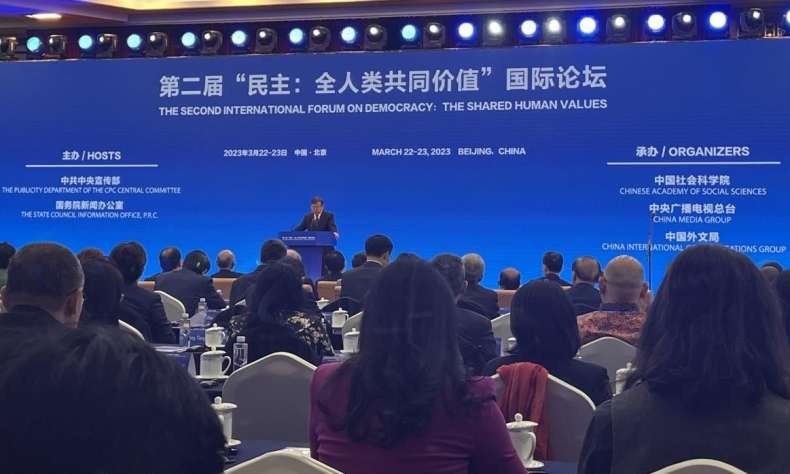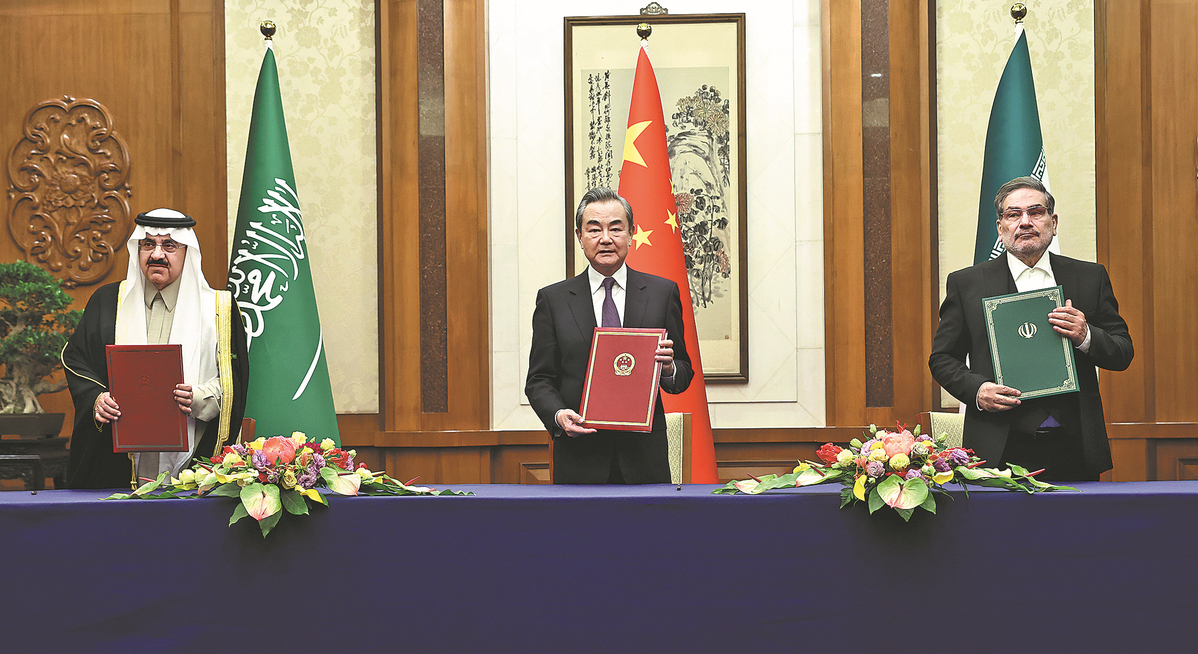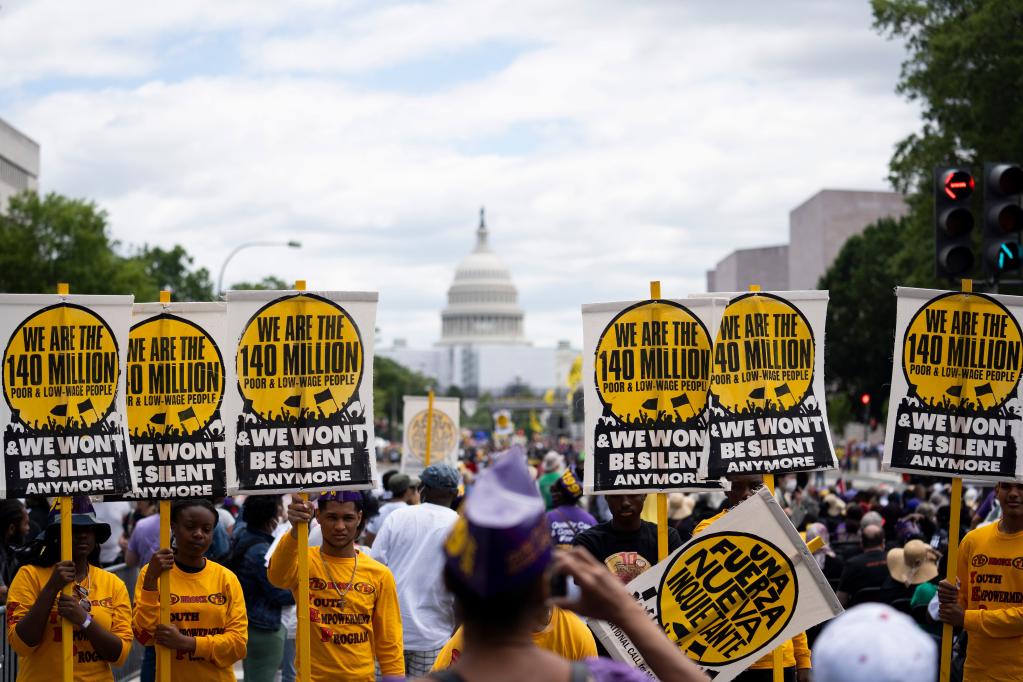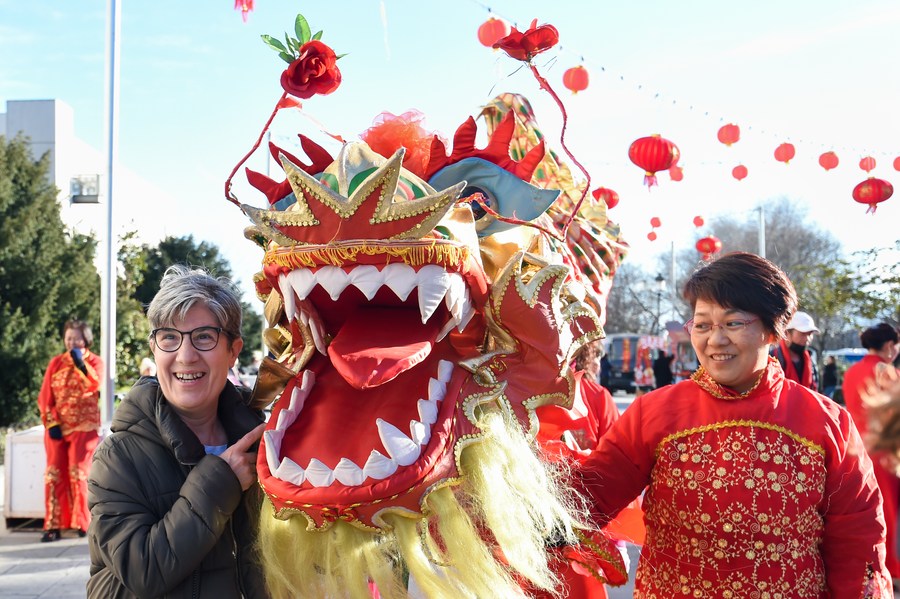Western Democracy: A Democracy in Distress

China and the United States have contributed two types of democracies to humanity. It’s utterly wrong to insist that Western democracy is the only right democracy model and willingly impose such democracy on other countries.
The Summit for Democracy 2023 scheduled to be held on March 28 in the U.S., as usual, is expected to accuse other countries of being authoritarian, based on its own standard and out of the hegemonistic mindset. Is such an accusation well-grounded? Participants of the Second International Forum on Democracy, which concluded days earlier on March 23 in Beijing, beg to differ, including voices from some Western countries.
Democracy in diversity
Time and again, the U.S. has imposed Western democracy on other countries, labeling others as authoritarian regimes and even waging wars. Jeffrey Sachs, professor of Columbia University, speaking to the forum via video, acknowledged, “There is no magic formula, no single set of institutions and no single model of good governance that one can apply to each place, because every country has its political culture, its specific orientations and needs, and its local and historical circumstances that will shape the political institutions.” Such a statement reflects a consensus reached by all the participants: democracy models are diverse and there is no “one-size-fits-all” approach to democracy.
Lee Camp is an American writer, comedian and former host for Russia Today. He told China Today at the forum, “Different cultures have different values, but many of those values overlap and are shared. It’s important to understand the differences in those cultural experiences and those all influence the type of democracy they have and what they feel democracy is.”
Camp further reflected on the U.S. government’s actions and said, “My own country likes to say we stand for democracy, we want democracy, but the truth is that we go into countries and upend their democracy and their civilization when it doesn’t serve our purposes. That’s not sharing values. That’s not cooperation. That’s not creating a sustainable world. I think that is how we fail.

As the theme of this year’s forum indicated, democracy is a shared human value, but it does not mean that every country must adopt the same type of democracy. Western democracy is just one type of democracy. It suits Western countries’ national conditions but not that of many others, especially the Global South. Likewise, China’s whole-process people’s democracy is based on China’s national conditions and has proven to be workable and successful as it has ensured people’s human rights, for example, the fundamental rights to health and safety during the COVID-19 pandemic, and the human rights to subsistence by lifting tens of millions of people out of poverty, and contributed to the development of democracy in the world.
Western democracy and Chinese democracy should and can coexist. It’s groundless and pointless to say that Western democracy is superior to Chinese democracy according to George Galloway, leader of the Workers Party of Britain and former Member of Parliament for nearly three decades. He expressed his opinion at the forum, “China achieved more in the last few weeks in bringing together Saudi Arabia and Iran, the schools of the Sunni and Shiite branches of Islam, than decades of Western domination.”
Democracy in disguise
For a long time, the West, especially the U.S., has presented itself as the model of democracy. Nevertheless, Galloway pointed out the essence of Western democracy while addressing the forum, “In Western democracies, we have two cheeks of the same butt side, two sides of the same coin. Sure you can go for this party or that party, but both parties stand for the same thing and have the same program essentially of neoliberal economics and imperialism abroad,” he said.
The loud protests against the pension reforms on the streets of France, the long queues outside the U.K.’s NHS hospitals, and the grief-stricken tears shed at the mass shooting scenes at American schools speak volumes to the fact that Western democracy is not delivering for the Western people, and looks more like a damsel in distress.
Western democracies should focus on their own domestic issues. Jeffrey Sachs argued, “In American society, political institutions are not functioning well right now, in part because big money in campaign finance lobbying corrupted a lot of the political system. Institutions need to be renovated, operate properly, and fight against the corruption of the political systems themselves.”

Michael Dunford, Emeritus Professor of the University of Sussex shared with China Today his concerns for Western democracy: “I think that [Western] political institutions have failed the people and the political elites are increasingly out of touch with the people.”
“In the West, people basically hear bad news from the media. If you hear bad news about your town, you know actually it’s not very common. If you hear it about another part of the world, then you tend to think it’s common. Many ordinary people would misunderstand. They really don’t understand the situation in other parts of the world due to the negative information from the media,” said Dunford, adding “For people who travel to other places, when they arrive, they’re actually sometimes quite surprised at what they find.”
Lee Camp is a victim of such biased campaigns. He told China Today, “Corporate media work very hard to shut down opposing thoughts to the acceptable narrative for the government. That is why I am heavily suppressed. That’s why my main channels have all been deleted. It is because specifically, the corporate media and the corporate entities that work hand in fist with our government, have to shut down those opposing narratives.”
A vote of no confidence
To have a peaceful world, Western democracies should find ways to coexist with other types of democracies, including China’s whole-process people’s democracy. Over the past few years, the U.S. has been trying to contain China’s development by launching trade wars, falsifying the human rights situation in Xinjiang, and sanctioning Chinese tech companies, among many others. It has also waged and incited wars in other so-called “undemocratic” countries like Iraq, which showcase the hypocrisy of American democracy and were criticized by people wordwide.
In contrast, Chinese president Xi Jinping proposed the Global Civilization Initiative at the CPC in Dialogue with World Political Parties High-Level Meeting on March 15. He said, “Peace, development, equity, justice, democracy and freedom are the common aspirations of all peoples. Countries need to keep an open mind in appreciating the perceptions of values by different civilizations, and refrain from imposing their own values or models on others and from stoking ideological confrontation.” The initiative was applauded by many attendees of the forum, as it demonstrates how different democracies can jointly develop in the future.

Dunford said that, “Such [an] initiative is very important because it’s about respecting other civilizations. Different civilizations have made enormous contributions to the variety of humankind. People have to respect these differences and live to find ways of living with people, cooperating with them and discussing and solving problems.”
He observed, “Western civilization has to rediscover a sense of solidarity. It has to recognize that Western nations are just nations like any other nation. In other words, the Western civilization has to start to accept that they are ordinary countries that share this world with other countries.”
Speaking to China Today at the forum, Jerrie Ueberle, Founder & CEO of U.S.-based Global Interactions, said that China’s whole-process people’s democracy is “really commendable and is going to have a long impact. China and America are the greatest hope for the world’s future. I’m really saddened to see the conflict and confrontation between the two countries. They should listen to one another, get over having their own ways, and be able to be patient and urgent about China-U.S. friendship.”
China and the United States have contributed two types of democracies to humanity. Participants of the Second International Forum on Democracy agreed that it’s utterly wrong to insist that Western democracy is the only right democracy model and willingly impose such democracy on other countries.
 Facebook
Facebook
 Twitter
Twitter
 Linkedin
Linkedin
 Google +
Google +










